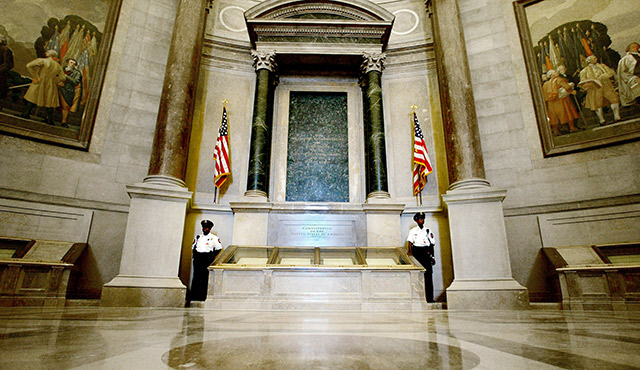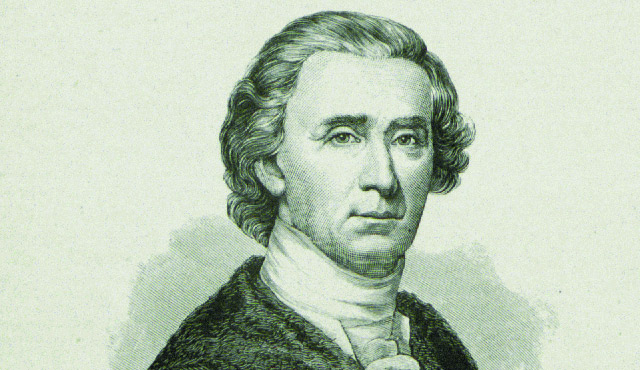“Congress shall make no law respecting an establishment of religion, or prohibiting the free exercise thereof.” Those 16 words, part of the First Amendment to the Constitution of the United States, have assured that all generations of Americans have the right to worship their God and practice their faith as they see fit without any fear of interference, reprisal, or show of favoritism by the civil government. When that phrase was adopted as part of the Bill of Rights in 1789, religious freedom had been one of the hallmarks of American democracy for the better part of 150 years.
As we all remember from our elementary school history classes, the Puritan pilgrims who landed in North America in 1620 were motivated to come to these shores by a desire to escape the religious persecution they were subjected to in England. Father Troy Schneider, parochial vicar at Holy Family Cathedral in Orange, points out that it did not take long for that desire to spread to other minority religious groups suffering their own persecutions. “The idea of religious freedom grew from the Puritans,” Fr. Troy says, “and many others came seeking the same freedom.”
Roman Catholics in the Colonial period, though, did not always enjoy the fruits of that spirit of religious liberty. Many behind that movement were generally from a Protestant sensibility and viewed Catholics with dislike and mistrust, even to the point of considering them to be representatives of a foreign power and questioning their loyalty to America.
When Charles Carroll of Maryland was the only Catholic signatory of the Declaration of Independence, it was illegal for Catholics to hold public office or vote in Maryland, although those restrictions and biases would be gone by the time the American Revolution was won and independence secured. That was due in part to a relatively unheralded episode of the war when George Washington requested that Charles Carroll and his brother John, who would later become the first Catholic Bishop of Baltimore, accompany Benjamin Franklin and Samuel Chase on a mission to try and secure the support of Canadian Catholics in the war effort.
The good relations that the Carrolls would enjoy over the decades with men like Washington, Franklin, and Thomas Jefferson would do much to advance the sentiment that Catholics could be fully trusted partners in the American experiment in democracy and self-government.
As the newly independent United States of America was struggling with its early growing pains, the issue of religious liberty was never far from the minds of the men who convened the Constitutional Convention to sort out the problems and draw up a plan by which Americans could govern themselves for generations to come. “Religious freedom was of great importance to the founders of American government,” says Professor Erwin Chemerinsky, dean of the University of California, Irvine, School of Law.
“They had seen the problems of state mandated orthodoxy. They believed in freedom of conscience, including religious conscience,” Dean Chemerinsky says. “I think it is reflected in Thomas Jefferson’s famous statement that there needs to be a wall that separates church and state.”
As with so many other aspects of our experiment in popular government, how we deal with the matter of religious freedom is still far from perfect.
“Much work needs to be done to clarify what we understand to be the practice of faith,” Fr. Troy says. As to the Church’s role vis á vis the civil government, Fr. Troy explains that it is the role of legislatures to write laws and the role of the Church to comment and advise on the morality of those laws to the faithful.
Conflicts regarding the free exercise of religion generally crop up when a person’s duty to comply with a law conflicts with his or her religious beliefs or practices. “The Supreme Court has been clear that a person’s religious beliefs generally do not provide a basis for violating the law,” says Dean Chemerinsky. “So long as it is a law that applies to everyone and was not meant to target religion; free exercise of religion does not provide a defense for violating it,” he explains. “Of course, laws sometimes create exceptions for religious conscience.”
Even through the struggle to determine what is “the good of all” from the constitutional point of view, Fr. Troy explains one noteworthy asset arising from our safeguards on religious freedom. He notes that organizations like the United States Conference of Catholic Bishops and others can be as outspoken as they wish regarding the various issues facing our society from their various faith perspectives without any fear of governmental reprisals.
“No provision in our Constitution ought to be dearer to man than that which protects the right of conscience against the enterprises of civil authority.” Thomas Jefferson wrote those words in 1809. Even today, well into the 21st century, the United States holds a unique place among the world’s nations in terms of the people’s freedom to worship their God in any way they consider appropriate.


